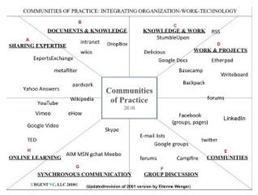Lesson 5 - Theories of Learning
28. Communities of Practice
28.2. What are Communities of Practice?
Definition
Communities of practice are groups of people who share a concern or a passion for something they do and learn how to do it better as they interact regularly.
Wenger, 2014
What are Communities of Practice?
The basic premise behind communities of practice is simple: we all learn in everyday life from the communities in which we find ourselves. Communities of practice are everywhere. Nearly everyone belongs to some community of practice, whether it is through our working colleagues or associates, our profession or trade, or our leisure interests, such as a book club. Wenger (2000) argues that a community of practice is different from a community of interest or a geographical community in that it involves a shared practice: ways of doing things that are shared to some significant extent among members.
Characteristics
Wenger argues that there are three crucial characteristics of a community of practice:
- Domain: A common interest that connects and holds together the community.
- Community: A community is bound by the shared activities they pursue (for example, meetings, discussions) around their common domain.
- Practice: Members of a community of practice are practitioners; what they do informs their participation in the community; and what they learn from the community affects what they do.
Wenger (2000) has argued that although individuals learn through participation in a community of practice, more important is the generation of newer or deeper levels of knowledge through the sum of the group activity. If the community of practice is centered around business processes, for instance, this can be of considerable benefit to an organization. Smith (2003) notes that:
…Communities of practice affect performance..[This] is important in part because of their potential to overcome the inherent problems of a slow-moving traditional hierarchy in a fast-moving virtual economy. Communities also appear to be an effective way for organizations to handle unstructured problems and to share knowledge outside of the traditional structural boundaries. In addition, the community concept is acknowledged to be a means of developing and maintaining long-term organizational memory.
Brown and Duguid (2000) describe a community of practice developed around the Xerox customer service representatives who repaired the machines in the field. The Xerox reps began exchanging tips and tricks over informal meetings at breakfast or lunch and eventually, Xerox saw the value of these interactions and created the Eureka project to allow these interactions to be shared across the global network of representatives. The Eureka database has been estimated to have saved the corporation $100 million. Companies such as Google and Apple are encouraging communities of practice through the sharing of knowledge across their many specialist staff.
TechnologyTechnology provides a wide range of tools that can support communities of practice, as indicated by Wenger (2014) in the diagram below:
